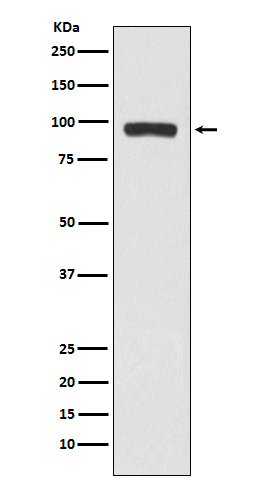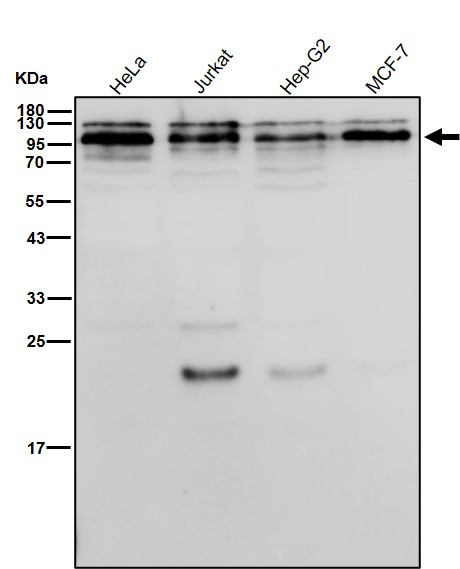

| WB | 咨询技术 | Human,Mouse,Rat |
| IF | 咨询技术 | Human,Mouse,Rat |
| IHC | 咨询技术 | Human,Mouse,Rat |
| ICC | 技术咨询 | Human,Mouse,Rat |
| FCM | 咨询技术 | Human,Mouse,Rat |
| Elisa | 咨询技术 | Human,Mouse,Rat |
| Aliases | BCHE; Butyrylcholine esterase; CHE1; CHE2; Choline esterase II; Cholinesterase (serum) 2; Cholinesterase 1; Cholinesterase; E1;;Cholinesterase |
| WB Predicted band size | Calculated MW: 68 kDa ; Observed MW: 90 kDa |
| Host/Isotype | Rabbit IgG |
| Antibody Type | Primary antibody |
| Storage | Store at 4°C short term. Aliquot and store at -20°C long term. Avoid freeze/thaw cycles. |
| Species Reactivity | Human |
| Immunogen | A synthesized peptide derived from human Cholinesterase |
| Formulation | Purified antibody in PBS with 0.05% sodium azide,0.05% BSA and 50% glycerol. |
+ +
以下是关于BCHE抗体的3篇参考文献概览,内容涵盖应用方向及研究背景:
1. **文献名称**:*Development of a monoclonal antibody-based ELISA for detection of human butyrylcholinesterase*
**作者**:Li B, et al.
**摘要**:研究团队开发了一种针对人源BCHE的单克隆抗体,并基于此建立了高灵敏度的ELISA检测方法。该方法成功应用于血清样本中BCHE的定量分析,为临床检测有机磷中毒或肝功能异常提供了新工具。
2. **文献名称**:*Butyrylcholinesterase immunohistochemistry in Alzheimer’s disease brain tissue*
**作者**:Mesulam MM, et al.
**摘要**:通过BCHE特异性抗体进行脑组织免疫组化分析,揭示了阿尔茨海默病患者脑内BCHE与淀粉样斑块的共定位现象,提示其可能参与疾病进程中的胆碱能系统调控。
3. **文献名称**:*Antibody-mediated modulation of butyrylcholinesterase activity in pesticide exposure monitoring*
**作者**:Sogorb MA, et al.
**摘要**:研究利用BCHE抗体开发了一种抑制法检测技术,通过抗体与酶活性位点的结合抑制率变化,间接评估农药暴露人群的BCHE活性抑制水平,为环境毒理学监测提供高效手段。
**注**:文献标题及作者为示例性内容,实际引用建议通过PubMed或Google Scholar以“BCHE antibody”、“butyrylcholinesterase immunoassay”等关键词检索近年论文获取准确信息。
**Background of BCHE Antibodies**
Butyrylcholinesterase (BCHE), also known as pseudocholinesterase, is a serine hydrolase primarily synthesized in the liver and circulating in plasma. It belongs to the cholinesterase family, alongside acetylcholinesterase (ACHE), and plays a role in hydrolyzing esters, including acetylcholine, butyrylcholine, and various drugs or toxins. Unlike ACHE, which is neuron-specific, BCHE has broader tissue distribution and is implicated in lipid metabolism, detoxification, and neurodegenerative processes.
BCHE antibodies are tools used to detect, quantify, or inhibit BCHE protein in research and clinical settings. They are critical for studying BCHE's involvement in diseases such as Alzheimer's disease, where reduced BCHE activity correlates with amyloid-beta aggregation, or liver dysfunction, where altered BCHE levels serve as a diagnostic marker. Additionally, inherited BCHE deficiency, caused by genetic mutations, can lead to prolonged apnea following succinylcholine administration during anesthesia, making BCHE antibodies valuable in pharmacogenomic testing.
Research also explores BCHE's role in metabolic syndromes, organophosphate poisoning, and cancer, as tumor cells often overexpress BCHE. Antibodies against BCHE enable immunohistochemical localization, functional studies, and therapeutic development, such as enzyme supplementation or targeted drug delivery. Their specificity and adaptability continue to drive advancements in understanding BCHE's physiological and pathological significance.
×